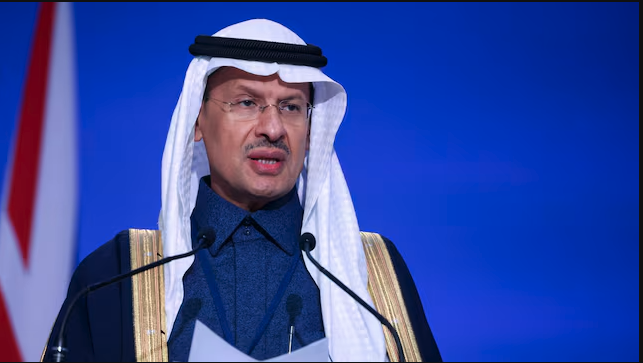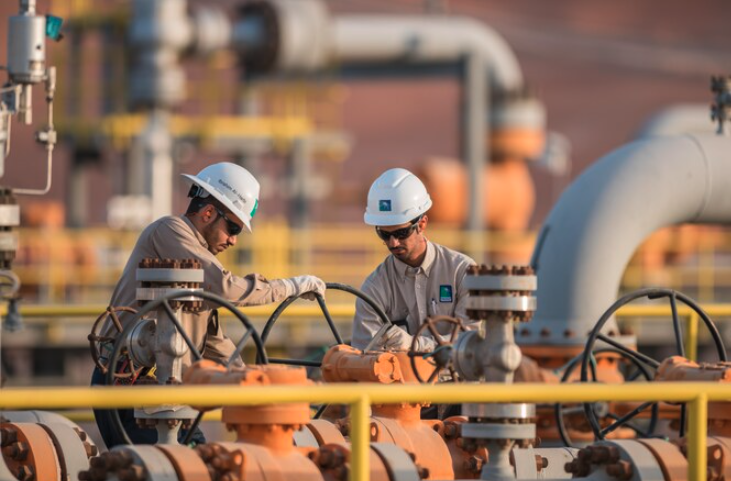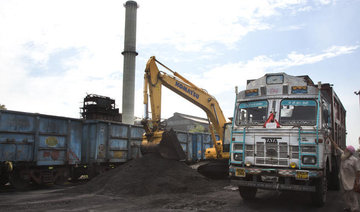UNCHA AMIRPUR: Subedar Singh bears the scars of India’s painful reliance on dirty power and its struggle to pay for the costly transition to the brave new world of solar and renewable electricity.
Last year, the farmer walked into a field in his village and suffered 70 percent burns to his feet and ankles from an underground coal fire caused by a nearby power plant. Singh said he dragged himself out of the field and then fainted from the searing pain.
The people of Uncha Amirpur in the northern Uttar Pradesh state — east of the smog-afflicted capital New Delhi — discovered that a mix of water and coal used by the nearby NTPC Dadri power plant had accumulated under the field and caught fire. Some cattle died.
Hundreds of millions of people in India are forced to live with the fallout of the dirtiest fuels — with the government blaming a lack of funds to pay for greener power.
Money will be the key issue when about 100 countries meet in Paris on Tuesday for the One Planet Summit organized by French President Emmanuel Macron. The meeting will focus on marshalling public and private funds to speed the move to a low-carbon economy.
Developing countries say barely a tenth of the $100 billion (SR375 billion) promised by the end of the decade under a 2010 deal has come in so far.
“If more money is available, of course the (Indian) government is in a position to push renewable energy faster,” energy analyst Narendra Taneja said.
“The pollutants accumulated over the decades, we didn’t do that. It was the West and they should clear up those dues as soon as possible,” said Taneja, a consultant to the ruling Bharatiya Janata Party.
India needs $140 billion to reach Prime Minister Narendra Modi’s ambitious target of installing 100,000 megawatts of solar power by 2022, according to Arunabha Ghosh, chief executive of the Council on Energy, Environment and Water, a New Delhi think tank.
So far it has just 15,000 MW, less than five percent of the country’s total generation capacity of 331,000 MW.
Developing countries “have stayed committed to the Paris agreement, even after the US decision to exit, but their ability to scale up ambitions is contingent on how much rich countries do at home and how much they support actions outside,” Ghosh said.
“Next year could be a tipping point for their patience.”
As one of the fastest growing major economies, India needs uninterrupted power to keep factories humming and the economy expanding.
Currently, 66 percent of its electricity is generated by coal and gas. The rest comes from nuclear and renewables, including hydro, wind and solar.
India needs renewable energy to meet its 2015 Paris commitment to reduce emissions relative to gross domestic product by up to 35 percent by 2030 from 2005 levels.
A lack of affordable options to store wind and solar energy means cheap coal is India’s mainstay. More than 300 coal power plant units missed a December 7 government deadline to upgrade with emissions reduction technology.
The impact is visible in Uncha Amirpur, where a thick coat of grime and dust covers every surface.
The Dadri power plant provides up to one third of the electricity required for New Delhi, 66 kilometers away by road, but also fuels the smog that envelops the Indian capital each winter.
The severe air pollution in New Delhi — many times the global safe limit — has been linked to asthma, bronchitis and even brain disease in babies.
Mandeep Raghav, a village local trying out for the Uttar Pradesh state cricket team, said there are days when he finds it hard to breathe.
“When I run, it’s okay for a while as I absorb the pollution, but at night when I sleep, I can feel my heartbeat increasing,” the 23-year-old batsman, whose father died of asthma in April, said.
“Sometimes I feel like I’m about to die.”
Ishwar Chand Sharma, who earns about 7,000 rupees a month as a mechanic at the coal plant, said: “For most of this year, I’ve been sick at least 10 days a month and missed work.”
Ash from the coal plant spreads to nearby villages, including Salarpur Kala, which is sandwiched between the plant and two cement factories.
Satbir Singh, a retired soldier who took up farming, said the ash ruins his crops.
“There’s a thick layer on the buds that just kills the wheat,” he said. “At least half of the 200 acres here was wiped out in October.”
Pollution conundrum: India faces painful move to cleaner energy
Pollution conundrum: India faces painful move to cleaner energy

Oil Updates — crude slumps as Trump’s higher-than-expected tariffs expected to crimp demand

- Brent, WTI sink as much as 3 percent, biggest percentage drop in a month
- Trump to impose 10 percent minimum tariff on most import goods
- Imports of oil, gas, refined products exempted from new tariffs
SINGAPORE: Oil prices fell by as much as 3 percent on Thursday after US President Donald Trump announced sweeping new tariffs that investors worry will enflame a global trade war that will curtail economic growth and limit fuel demand.
Brent futures were down $1.97, or 2.63 percent, to $72.98 a barrel by 9:35 a.m. Saudi time after dropping by as much as 3.2 percent earlier, the biggest daily percentage decline since March 5.
US West Texas Intermediate crude futures were down $2.01, or 2.80 percent, to $69.70 after slipping by as much as 3.4 percent earlier.
Trump on Wednesday unveiled a 10 percent minimum tariff on most goods imported to the US, the world’s biggest oil consumer, with much higher duties on products from dozens of countries, kicking into high gear a global trade war that threatens to drive up inflation and stall US and worldwide economic growth.
“The US tariff announcement clearly caught markets off guard. Pre-announcement speculation suggested a flat 15-20 percent tariff, but the final decision was more hawkish,” Yeap Jun Rong, market strategist at IG, said in an email.
“For oil prices, the focus now shifts to the global growth outlook, which is likely to be revised downward due to these higher-than-expected tariffs,” he added.
Imports of oil, gas and refined products were exempted from the new tariffs, the White House said on Wednesday.
The tariffs sent markets reeling on Thursday, with Japan’s Nikkei plunging to an eight-month low, China’s yuan dropped to its lowest levels in seven weeks and stock markets slumped in early Asia trade.
“We know it will be negative for trade, economic growth and thus oil demand growth. But we don’t know how bad it will be as the effects come a little bit down the road,” said Bjarne Schieldrop, chief commodities analyst at SEB.
On Wednesday, UBS analysts cut their oil forecasts by $3 per barrel over 2025-2026 to $72 per barrel, citing weaker fundamentals.
Traders and analysts now expect more price volatility in the near term, as the tariffs may change as countries try to negotiate lower rates or enact retaliatory levies.
Market participants are also waiting for clarity on OPEC+ production outlook as the group is meeting on Thursday.
The group is set to proceed with its schedule to raise oil output by 135,000 barrels per day in May, and discuss how to convince Kazakhstan to stop exceeding its output quota and plans to compensate for overproduction, sources told Reuters.
Reinforcing the bearish sentiment, the Energy Information Administration data on Wednesday showed US crude inventories rose by a surprisingly large 6.2 million barrels last week, against analysts’ forecasts for a decline of 2.1 million barrels.
Inventories gained amid a surge in imports from Canada, which had expected to be hit with tariffs on its crude shipments to the US
The EIA data also showed gasoline demand was lower last week and refinery runs were lower at a time of year that plants should be producing more fuel ahead of the summer driving season.
OPEC+ to meet over excess Kazakh oil output

- OPEC+ members are scheduled to raise oil output by 135,000 barrels per day in May
LONDON: Eight members of OPEC+, the oil producers group led by Saudi Arabia and Russia, will meet on Thursday to discuss how to convince Kazakhstan to stop exceeding its output quota and how it can compensate for overproduction.
Record Kazakh output has angered several other members of the group. The meeting “is just to make the new Kazakhstan minister aware of the importance of meeting his required production and compensating for the surplus,” one delegate said. Erlan Akkenzhenov was appointed Energy Minister last month.
OPEC+ members are scheduled to raise oil output by 135,000 barrels per day in May, and the group is expected to proceed with this plan. The May increase is the next increment of a plan agreed by Saudi Arabia, Russia, the UAE, Kuwait, Iraq, Algeria, Kazakhstan and Oman to gradually unwind their most recent output cut of 2.2 million barrels a day, which came into effect this month.
OPEC+ also has 3.65 million barrels a day of other output cuts in place until the end of next year. This week Russia ordered the Black Sea terminal handling Kazakhstan’s oil exports to close two of its three moorings, a move which is widely expected to slash the country’s production as a result.
New Saudi real estate directives reinforce home ownership goals: Finance minister

RIYADH: Saudi Arabia’s newly announced real estate directives underscore the Kingdom’s commitment to increasing homeownership among its citizens, according to the finance minister.
The changes were initially announced in March, following a comprehensive study by the Royal Commission for Riyadh City and the Council of Economic and Development Affairs.
The review examined land price dynamics and rental pressures in Riyadh and proposed a set of regulatory and planning solutions aimed at long-term market stabilization.
Among the key provisions is the lifting of restrictions on land transactions and development in targeted areas of northern Riyadh.
In an interview with Alekhbariyah, Mohammed Al-Jadaan said Crown Prince Mohammed bin Salman’s mandates are intended to raise the proportion of Saudi families who own homes to 70 percent by 2030 – up from 47 percent in 2016.
“The generous directives will contribute to reducing volatility and controlling the rise in real estate sector prices, and will also limit inflation in the Kingdom’s economy,” Al-Jadaan stated.
The move authorizes the sale, purchase, division, and subdivision of land, as well as the issuance of building permits, across a 17-sq.-km area bordered by King Khalid Road and Prince Saud bin Abdullah bin Jalawi Road, and a 16.2-sq.-km section north of King Salman Road, extending to Abu Bakr Al-Siddiq Road and the Al-Qayrawan District.
These areas, combined with previously released plots, bring the total available for development to 81.48 sq. km.
Al-Jadaan said the expanded land access will tighten the supply and demand gap in the real estate sector by lifting restrictions on transactions and development in northern Riyadh.
He noted that developers are expected to respond by expanding commercial and residential projects, ultimately easing price pressures.
To further facilitate home ownership, the RCRC has been tasked with delivering between 10,000 and 40,000 fully planned and developed residential plots annually for the next five years.
These will be priced at no more than SR1,500 ($399.87) per sq. meter and made available to married citizens or individuals over the age of 25 who do not currently own real estate.
The issued plots will be subject to resale, rental, and mortgage restrictions for 10 years unless used to finance construction. If the land remains undeveloped within that time, ownership will revert to the government, with the buyer reimbursed.
Al-Jadaan emphasized that these changes would improve access to financing. Saudi citizens will have better chances to obtain financial support to own a residential home or a commercial estate, he explained.
Additional reforms include amendments to the white land fees system, to be implemented within 60 days, aimed at incentivizing the development of unused land.
Within 90 days, the government will introduce new regulatory measures to ensure balanced relationships between landlords and tenants.
The General Authority for Real Estate and the RCRC will monitor price trends and submit periodic reports to evaluate the effectiveness of the measures.
Al-Jadaan further noted that these initiatives prove the Kingdom’s ability to stabilize the real estate sector’s volatility through entities, institutions, and regulations.
Saudia expands European footprint with seasonal Vienna, Athens routes

RIYADH: Saudi Arabia’s national carrier Saudia has launched direct flights to Vienna and Athens as it enhances its presence in Europe as part of a broader network expansion strategy.
The airline will operate three weekly flights to the Austrian capital, which began with an Airbus A320 service from King Abdulaziz International Airport to Vienna International Airport, the company said in a statement.
Saudia plans to extend the service with flights from Riyadh’s King Khalid International Airport starting in June.
The aviator also launched seasonal flights to Greece’s capital, which will run three times per week, with the inaugural flight departing from Riyadh on April 2, also operated by an Airbus A320.
The national flag carrier is also set to introduce flights from Jeddah to Athens starting in June 2025.
The routes are part of a previously announced plan to introduce 11 new destinations this year, including Venice, Athens, and Nice as well as Malaga and Bali.
The expansion comes as Saudia posted a 16 percent year-on-year increase in international passenger traffic in 2024, aligning with the Kingdom’s National Tourism Strategy, which targets 150 million annual visitors by 2030.
Marking the Vienna flight, the airline posted on its official X account: “This new destination is an addition to Saudia’s network of over 100 destinations across four continents, supporting national efforts to grow tourism, entertainment, sports, and religious travel, including Hajj and Umrah.”
The new routes come after the airline launched a three-weekly service to Bali earlier this week, its second regular route to Indonesia after Jakarta.
Last month, the airline also signed an agreement with Indonesia’s Ministry of Religious Affairs to expand pilgrim transportation and improve services for the 2025 Hajj season.
The new services strengthen Saudia’s role in the Kingdom’s Air Connectivity Program, which has introduced more than 60 direct international routes since its 2021 launch.
With a fleet of 147 Boeing and Airbus aircraft, the airline plans to expand further, with 118 new aircraft set to join its operations.
As part of its 2025 network expansion, Saudia is also set to launch flights to Antalya, Turkiye, and Salalah, Oman, underscoring its broader goal of increasing global market share and positioning itself as a key player in international travel.
Energy technologies under development more promising than ever before: IEA

RIYADH: The range of new energy technologies under development globally is broader and appears more promising than ever before, according to a prominent think tank.
In its latest report, the International Energy Agency said that the modern energy technology landscape is highly dynamic, with both emerging and established economies contributing to the growth of innovation in the sector.
The analysis from the IEA comes at a time when countries including Saudi Arabia are actively pursuing advanced technology in the sector, as the Kingdom is trying to diversify its energy mix through renewables and nuclear power.
“Innovation is the lifeblood of the energy sector, particularly in today’s fast-moving times with the global energy mix shifting and major trends such as electrification having far-reaching effects,” said Fatih Birol, executive director of the IEA.
He added: “A wide range of technologies now appears to be coming close to market, offering hope for improvements in energy security, affordability and sustainability over the long term.”
The energy agency further said that the global energy innovation landscape is at a pivotal moment amid signs of slowing momentum in financing and shifting priorities.
“We require investment, both public and private, to scale up innovative solutions. The payback may not always be quick, but it will be lasting,” said Birol.
R&D in energy innovation
According to the IEA, energy innovation has delivered major economic and security benefits worldwide.
Public research and development investments in response to energy crises in the 1970s, reaching 0.1 percent of the gross domestic product, drove the expansion of nuclear power and reduced many countries’ reliance on imported fuels.
Nuclear is set to form a key part of Saudi Arabia’s energy mix, and in January the Kingdom’s Energy Minister Prince Abdulaziz bin Salman also said that the nation is planning to begin enriching and selling uranium.
Launched in 2017, Saudi Arabia’s National Atomic Energy Project is a cornerstone of the Kingdom’s strategy to diversify its energy sources and reduce its dependence on fossil fuels.

An additional report by the IEA in January projected that annual investments in the nuclear energy development sector would need to double to $120 billion by the end of this decade to meet the rising demand for infrastructure development.
The initiative aims to integrate nuclear power into the national energy mix, enhancing sustainability and fulfilling international commitments.
In its latest report, the energy agency added that energy R&D spending has risen at around 6 percent per year in real terms, with direct government funding across the world up again in 2024, above the $50 billion of the previous year — although the rate of increase has slowed.
“Initial indications of spending in 2024 in the United States and Canada suggest flatter year-on-year growth, balanced by larger increases in Japan and Norway,” said the IEA.
Regarding other major innovative developments, the IEA said that technological advancements in batteries and electric vehicles have lowered oil import needs in China, while shale technology innovation transformed the US from an energy importer to a net exporter.
“The impacts of energy technology innovation are also visible at the level of trade balances. The implementation of horizontal drilling and hydraulic fracturing enabled the US to shift from importing 46 percent of its oil and natural gas needs in 2000 to exporting the equivalent of 10 percent of its demand today,” said the report.
It added: “Innovation in batteries, electric vehicles and their manufacturing enabled China’s oil imports to be 8 percent lower in 2024 than if these EVs had been conventional cars.”
Geographical shift in energy innovation
According to the report, the global landscape of energy innovation is currently witnessing a rapid shift, with nations like China becoming the largest single country for energy patenting in 2021, overtaking Japan and the US.
The IEA added that more than 95 percent of China’s energy patenting in 2022 was in low-emissions technology areas.
Globally, between 2000 and 2022, low-emissions energy patenting was four and a half times that for fossil energy.
The analysis highlighted that more innovation efforts globally are directed toward small-scale and modular energy technologies such as batteries and electrolyzer.
Around half of China’s energy patenting and 90 percent of its venture capital funding is directed to mass-manufactured and modular low-emissions technologies. Innovation in these areas has helped underpin the Asian nation’s lead in several energy technology supply chains.
In Europe, around 50 percent of energy patenting is directed toward smaller-scale low-emissions technologies.
The IEA added that the continent is also active in large engineering projects that generally have more uncertain impacts on long-term competitiveness.
The analysis highlighted that energy inventions in the US are equally spread across fossil fuel as well as large- and smaller-scale low-emissions technologies.
VC funding landscape
The IEA revealed that VC funding for energy technologies surged more than sixfold from 2015 to 2022, reaching levels equivalent to all public energy R&D combined, helping 1,800 startups obtain private capital.
Some $230 billion has been injected into energy startups since 2015, and expectations for this market continue to grow.
“Even if only a fraction of these firms succeed, they could have a significant impact on global energy systems by the 2030s. However, this investment trend reversed in 2023 and 2024, with VC funding declining by more than 20 percent amid tighter financial conditions,” said the IEA.
It added: “The only sector to see growth in VC funding during this period was artificial intelligence, which offers potential to accelerate energy innovation but may also draw capital away from the energy sector.”
The report further said that the primary factor that resulted in the decline of VC funding was inflation, but other elements, like uncertainties about political commitments to climate policies, have also contributed to this trend.
Looking ahead to future funding trends, the IEA noted that early-stage investments in energy storage and batteries remain strong. Additionally, in 2024, there was a noticeable increase in funding for startups focused on technologies related to nuclear energy, synthetic fuels, and carbon capture, utilization, and storage.
In March, energy giant Saudi Aramco launched a pilot direct air capture unit capable of removing 12 tonnes of carbon dioxide annually from the atmosphere.
Aramco said that the facility, developed in collaboration with Siemens Energy is the Kingdom’s first carbon dioxide direct air capture unit.
Affirming its commitment to a sustainable future, Saudi Arabia is also building the world’s largest carbon capture hub on the east coast of the Kingdom in Jubail.
The project is a joint initiative of Saudi Aramco and the Kingdom’s Ministry of Energy and will have a storage capacity of up to 9 million tonnes of carbon dioxide a year by 2027.

Future outlook
The IEA said that it tracked 580 demonstration projects that are currently aiming to gather essential operational experience by 2030.
The report revealed that $60 billion in public and private financing has already been allocated to these projects in areas such as hydrogen-based fuel production, advanced nuclear designs, floating offshore wind, and CCUS.
“These projects are critical for commercialising emerging technologies but face delays due to inflation and policy uncertainty. Most projects have still not reached final investment decision and 95 percent of demonstration funding is concentrated in North America, Europe and China,” said the report.
It concluded: “At a time of shifting government priorities, coordinated action can nonetheless ensure that a global portfolio of projects bridge the ‘valley of death’ for key technologies to meet climate goals.”























